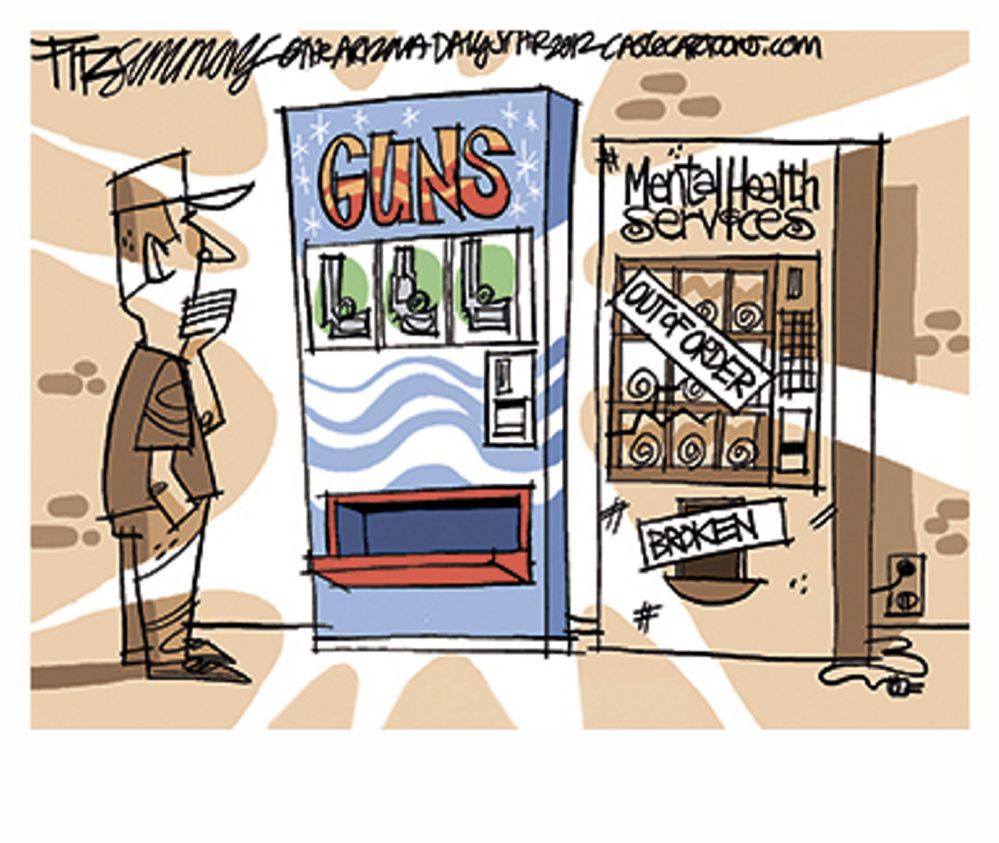It shouldn’t take a mass murder to get Congress to act on improving mental health care in this country, but if that’s what happens, it would be a welcome step in the right direction.
If it’s the only step they take, however, it won’t be anywhere near enough. The full response to the series of random mass killings like the one last week in Roseburg, Oregon, should also include measures to keep guns out of the wrong people’s hands.
We were encouraged to hear that U.S. Sen. Susan Collins, R-Maine, is backing the bipartisan Mental Health Reform Act of 2015, sponsored by Sens. Bill Cassidy, R-La., and Chris Murphy, D-Conn.
The bill would reward states that break down the walls between health care and mental health care; fund grants to develop programs that identify and treat people with severe disorders when they are as young as 3; and improve mental health and substance abuse treatment coverage under Medicare and Medicaid.
These reforms, and others outlined in the legislation, are long overdue. An estimated 44 million Americans — one in five adults — suffer from a serious mental illness, as do 90 percent of the people who commit suicide. People with untreated mental illness fill jail cells and homeless shelters.
When they try to seek treatment, they are faced with a bewildering maze of institutions, practitioners and insurance regulations, which create what can be insurmountable barriers.
The Mental Health Reform Act, which is endorsed by the National Alliance on Mental Illness, the American Psychiatric Association and other concerned parties, would improve access to care for people who really need it.
But as a response to gun violence, it is incomplete at best. Without looking at guns themselves and how they get into the hands of people who shouldn’t have them, you will not have a significant impact on shootings.
Collins is right to say that there is a mental health profile that fits many of the people who have been involved in the random shooting events of the last several years. They tend to be young, male, alienated and fixated on a variety of topics. Many are suicidal — which, say experts who study violence, can be a warning sign of an imminent outburst.
But she is equally correct when she says in remarks prepared to be delivered on the floor of the Senate on Thursday that improved mental health care is only one piece of what’s needed.
Collins restated her support for the Manchin-Toomey universal background check bill, which would prevent people with a criminal or psychiatric record from legally buying a gun, even in a private sale. Other sensible measures could include limits on high-capacity magazines and holding negligent firearms sellers liable for their customers’ actions, much as we hold hosts and bartenders accountable when they let guests drive drunk.
America is not the only country in the developed world with a population of people who live with mental illness, but it is the only one that sees this level of random violence on a regular basis. Part of the explanation may be the holes in our health care system, but we also must reconsider the easy access to firearms that pro-gun extremists demand, regardless of the consequences.
It is possible to respect a responsible adult’s right to keep and use guns for legal activities, including self-defense, while still taking measures to make it harder for those who shouldn’t have guns to get them.
The Mental Health Reform Act is a much-needed step, but it’s not nearly enough by itself.
Send questions/comments to the editors.



Success. Please wait for the page to reload. If the page does not reload within 5 seconds, please refresh the page.
Enter your email and password to access comments.
Hi, to comment on stories you must . This profile is in addition to your subscription and website login.
Already have a commenting profile? .
Invalid username/password.
Please check your email to confirm and complete your registration.
Only subscribers are eligible to post comments. Please subscribe or login first for digital access. Here’s why.
Use the form below to reset your password. When you've submitted your account email, we will send an email with a reset code.